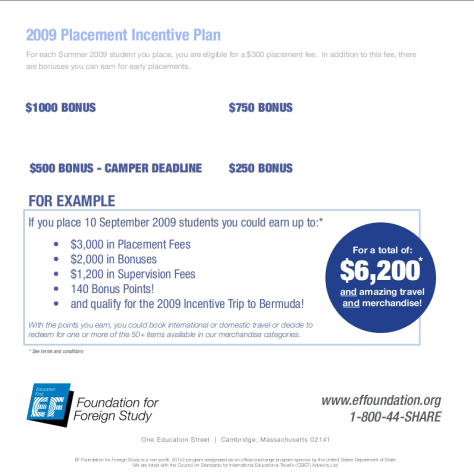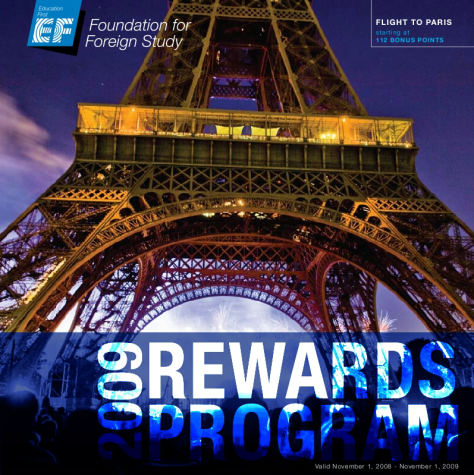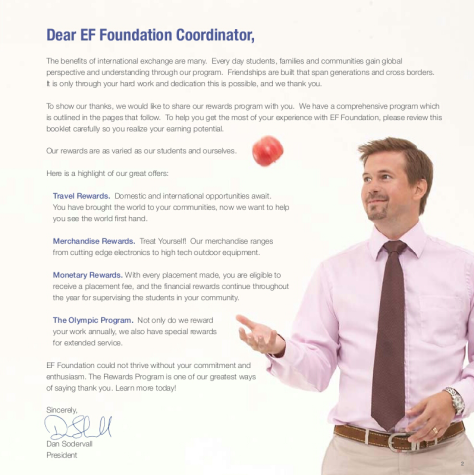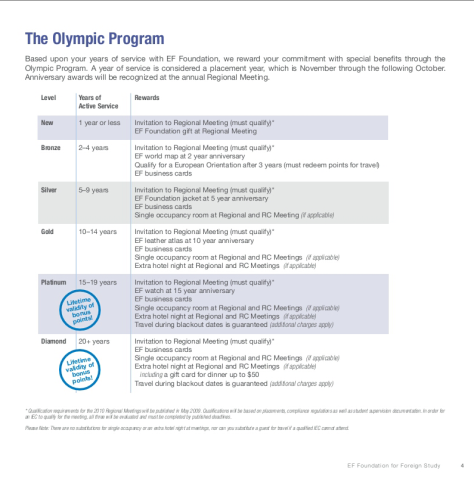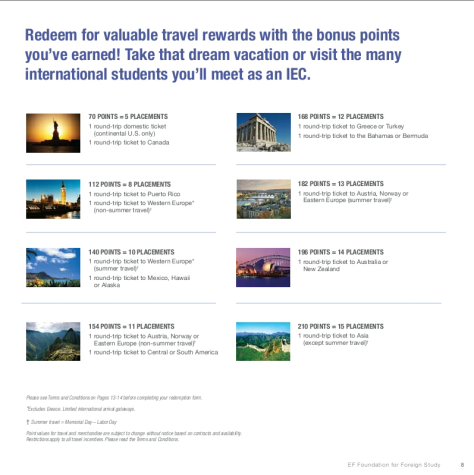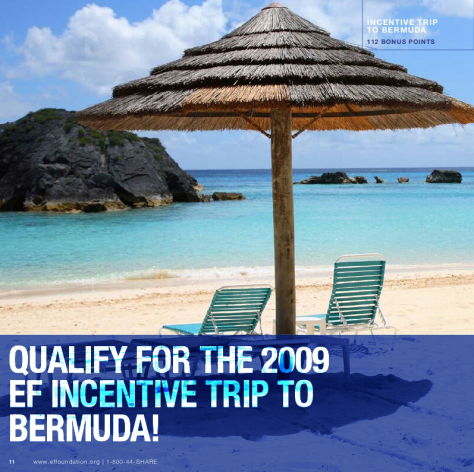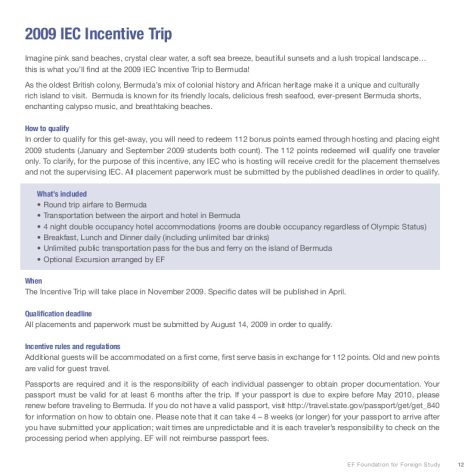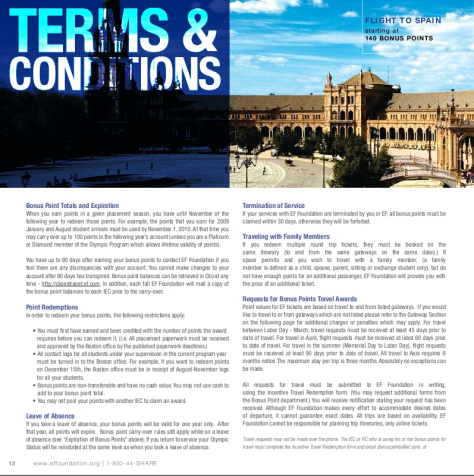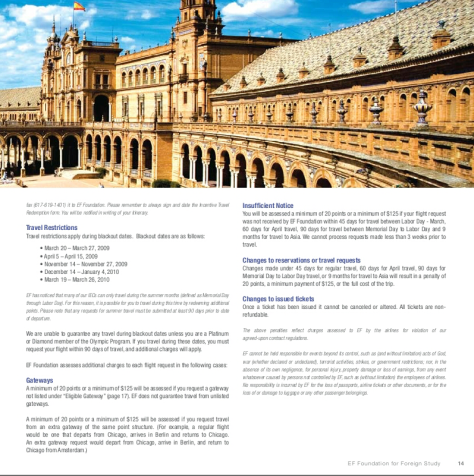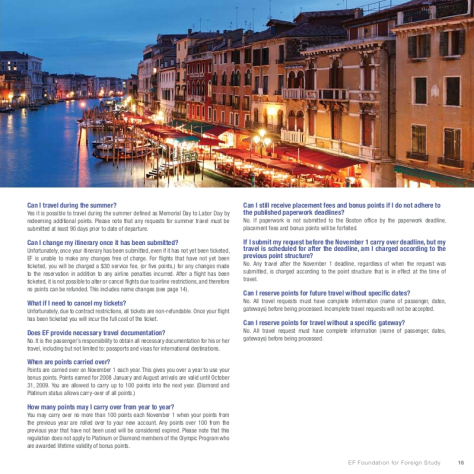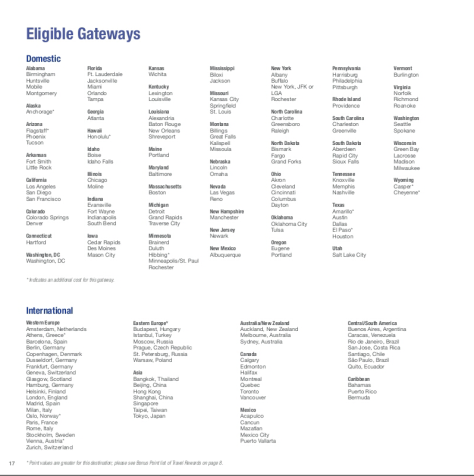(by Ragni Trotta)
Last year, 17-year old Synne Fjellvoll from Norway was one of 28,142 foreign exchange students granted a J-1 VISA to study in the U.S. as a foreign exchange student in 2009. Synne and her parents researched various student exchange programs before settling on the Education Foundation for Foreign Study (EF), which spread glossy brochures around Norway’s many highs schools and held a local EF seminar in their hometown promoting their student exchange program under the slogan “Personal Service”, “Safety”, “Quality”. At a cost of US$6,000, plus an extra US$500 to ensure that she was sent to the “Southern States”, everything seemed set for the experience of a lifetime. Says Synne; “I was so excited to study abroad in the United States of America. It was a dream come true.”
Synne’s dream was soon to turn into a nightmare. Placed in the care of what appeared to be an all-American host family in Branchville, South Carolina, she soon started to have misgivings of the people assigned to care for her wellbeing. In Synne’s case, the failure to do background checks on the host family as well as the local EF representative, both of whom the sponsoring organization had been using for years, were the gravest of several violations of Federal Regulations perpetrated by EF. Background checks would immediately have thrown up several red flags, had they ever been undertaken, as Federal Regulations clearly state. A closer look by a private investigator and ex-FBI agent has showed that the local EF representative assigned to Synne as her 24-hour support person; Linda Davis (or Linda J. Teller), in fact had 10 liens & judgments and 3 criminal convictions against her, as well as a history of using numerous aliases. Furthermore, 36 judgments and liens are registered against her host mother Gidget Vickers.
Federal Regulations state that foreign exchange students must be placed within a “nurturing environment” in a “financially stable home”. However, with the host father unemployed for the first 6 months of her stay and the host mother holding down two jobs to support the family’s 5 children, Synne’s chores swiftly added up to include babysitting the two youngest kids every day after school from 3:00 – 6:00 pm and on weekends, mow the lawn, walk the dogs, do the dishes and even wash her host sister’s clothes on Sundays. Explains Synne; “I never felt like part of the family, I felt like a maid. It hurt me when my 16-year old host sister was allowed to hang out with her friends and go to the movies, while I had to stay home to babysit.”
Worse, the home was clearly uninhabitable by most health & hygiene standards. Several untrained dogs were urinating and defecating around the house, which also suffered mould problems. Explains the exchange student; “The stench was disgusting. Several holes in the roof and walls were scantily covered by cardboard and boards, and the window in my room was broken. It was freezing in my room when the frost came”.
Host families are also required to provide meals for the students. However, Synne was quickly also told that she had to buy her own food as well as any other items that she needed. She was not allowed to eat from the family fridge and had to pay for her own food when the family ordered Chinese takeout, which was frequent. Branchville is a town 1,083 people, with 54% white and 43 % African American inhabitants. She was told by her host mother that “black people were a bad influence and would get her involved in drugs.”
Under the constant threat of being sent home, Synne was frequently forced to sign EF “ Success Plan for Student Behaviour” and “Academic Agreements” admitting to her many failures, presented to her by her host mother and local EF representative Linda Davis. Grounded for weeks and isolated in a foreign country far away from home, her telephone was confiscated and her internet access taken away for weeks on end, making it impossible for her to contact her family. Says Synne; “I was threatened by the host mother all the time. I was frequently told “Synne, you are in big trouble” and “if you don’t pull it together we are going to have to send you home early. And you have yourself to blame. You did this to yourself.”
According to local sources, it is common knowledge that the Vickers family uses foreign exchange students extensively for babysitting purposes and complaints have been raised against the family by previous exchange students. In 2007, the same family stopped providing adequate food to a 17 year old German girl (Sina Tuscheerer) who was an exchange student staying with them, forcing teachers at Branchville High School to purchase and place food for her in the school fridge. According to the teachers, the problem was reported to local area representative Linda Davis as well as EF in Boston several times, but no action was taken. Still, much to the astonishment of the teachers at Branchville High School, the Vickers family has continued to be on the receiving end of foreign exchange students, even hosting two students from Finland (Sointu Lampinen) and Sweden (Frida Edstrøm) at the same time.
Federal Regulations state that sponsoring organizations must provide a student card with a telephone number that affords immediate contact with both the program sponsor and the sponsor’s local representative. The regulations also state that local area representatives must check in with exchange students at least once a month. As early as in October 2009, Synne spent several days unsuccessfully trying to reach her local contact local EF representative Linda Davis on the telephone number written on her student card. Explained Synne; “I tried to call Davis several times. Nobody picked up the phone.” She then dialed the number to EF’s office in Boston and requested a change of family. The phone call was answered by Program Coordinator Claudia Jackson, who told her to call her local representative who according to Jackson was “always available”. Jackson stated that anyway, it was “too late to change family”. Synne’s student card failed to include a toll free phone number to the U.S. State Department, the supervisory body of student exchange programs, which according to Federal Regulations should have been printed on the card. Says Synne’s father Per Fjellvoll; “My daughter was held hostage in a house and with a family who did not want her there as anything other than a housekeeper and a babysitter.”
When Linda Davis finally contacted Synne in late December 2009, and the Norwegian exchange student again requested a change of family, the EF coordinator told her that she was; “always complaining and whining”. According to Davis, the Vicker’s were “a good family and you are the one making all this trouble for us. It is always the Norwegian exchange students that are hardest!” EF representatives also repeatedly turned their back on the 17-year old when she repeatedly turned to them for help via phone and email in January, February and March 2010. She was called a ‘liar”, a “troublemaker” and conveniently ignored. However, she complained one time too many and was “removed from the program” by EF in a whirlwind of accusations in March 2010, after what EF claimed were “a number of chances to improve her behavior”.
According to Toralf Slovik, EF’s Program Coordinator in Oslo, Norway, who contacted her natural parents, Synne was being sent home because she had been expelled by Branchville High School. Says her father; “I called the Principal of Synne’s High School and he told me that he knew nothing about my daughter being expelled.” The “expulsion” later turned out to be an erroneous translation of the word “detention”, but EF was adamant that she still had to be repatriated due to “bad behavior”, “bad grades” and too many “social activities”. Synne in fact had little time to commit to spare time activities due to daily babysitting responsibilities, house chores and two-three weekly Church visits. Says the exchange student; “My host mother told me that I had to take most responsibility since I was the oldest.”
The Principal and teachers at Branchville High School were deliberately kept at an arm’s length and forced to watch from afar, although several posed questions with Synne’s host mother’s demands for her to be enrolled in several too advanced and unnecessary classes, contrary to the curriculum that had been chosen for her in collaboration with her local high school and natural parents prior to her departure from Norway. While EF maintains that Synne had problems at school, neither the Principal, the school counselors or any of her teachers were at any time made aware of this fact. This highlights the total disconnect between the sponsoring organizations and the U.S. high schools to which they send their participants and one is forced to ask what kind of organization puts an exchange student with a B+ average on “Academic Agreement” without informing the school or any of her teachers. Says Synne’s father Per; “We had just received an email from EF saying that everything was fine and she was doing well in school. Of course, the positive news was sent to us along with the news that Synne had been involved in a car accident. That was probably no coincidence.”
On several occasions, host mother Gidget Vickers acted so threatening and aggressively towards the exchange student that even her teachers became concerned. More than one teacher witnessed Synne’s traumatic last day at Branchville High School; “Gidget Vickers showed up at school, verbally attacked Synne in front of several teachers and students, snatched her handbag and forced her to leave without saying goodbye to her friends and teachers.” After confiscating her phone, Vickers took her home to pack and subsequently drove the 17-year old to Charleston Airport, where the Norwegian exchange student and her luggage were thrown out of the car curbside and left to fend for herself.
According to Synne’s father, her premature repatriation was based on minor episodes and lies by EF and her host family who was just looking for a reason to send her home. “The accusations made against my daughter were subsequently proven false by emails and communications with the Principal and teachers at Branchville High School. Clearly, any serious organization would have taken immediate steps to correct the situation and let her finish the 9 weeks that remained of her school year.”
J-VISA STATUS
On the morning of March 23, Synne was told by EF that she had to be on the plane back to Norway that evening or she would be deported. At the point of her repatriation, three local families were willing to host Synne for the remainder of the school year. Torolf Slovik from EF informed the family by email that she would be in the U.S. illegally if she stayed beyond that evening and that her VISA had been cancelled. However, her host-mother Vickers and local EF representative Davis made it abundantly clear around town that anyone who took her in would be charged with harboring an illegal alien. Says Synne; “They were determined to send me home.”
Says Fjellvoll; “EF has gained a reputation for taking swift action only when it comes to sending students home, as was the case with my daughter. The family contacted the U.S. Embassy in Oslo and the U.S. Department of State in Washington and asked them to intervene so that Synne could complete the 9 weeks that remained to her graduation. The Norwegian Embassy in the U.S. was also contacted. However, the family was told that it was a private issue between the student and EF and that they could not do anything.”
The scaremongering that EF spreads regarding the deportation of students is completely untrue and inaccurate. According to Stanley Colvin, Deputy Assistant Secretary of the U.S. Department of State and supervisor of the J-VISA student exchange programs, foreign nationals that enter on a J-1 visa are “lawfully present” so long as they are in “valid program status”, meaning that they must be successfully pursuing the activities for which they entered the United States, under the sponsorship of a designated Exchange Visitor Program sponsor. If the sponsor withdraws their sponsorship, for cause, then the participant is no longer lawfully present and has thirty days to leave the country. Says Fjellvoll; “Having to leave in thirty days is vastly different to having to leave in a few hours. One month may have permitted us to seek other alternatives so that Synne could have completed her school year.”
When Synne’s case was brought to the attention of the U.S. State Department, they said they were willing to help her reissue her J-VISA provided EF reinstated Synne’s sponsorship. Alternatively, the State Department said they would accept the sponsorship of another exchange organization. Despite several requests both directly from the family as well as a U.S. lawfirm, EF refused to reinstate the sponsorship and finding another exchange organization 9 weeks prior to graduation proved an impossible task.
COMPLAINTS PROCEDURES
Under the current system, the student is completely powerless. EF will always side with their host family in any dispute, because any acknowledgement of mistakes on their part would make them liable to lawsuits. The student has absolutely no chance from the outset. The bias of local coordinators, who in many cases place young students with friends or relatives, is another issue some students have been faced with. Norwegian exchange student Synne Fjellvoll’s host mother was a friend of the local EF area representative and had a cell number to her that she refused to give the 17 year old exchange student. The local coordinator consistently ignored Synne’s requests for help.
According to Stanley Colvin, the U.S. Department of State cannot do anything to help once a student has been taken off a program. According to Colvin, sponsoring organizations can take student off a program for “cause”.
The question here become “what is cause” and more importantly, who determines what is “cause”? Under the current system, the sponsoring organization has the power to send a student home for anything it determines to be a “cause”, without any review of the situation or an interview with the student by an independent third party. What is even more disturbing is that when a student complains to the sponsor, the sponsoring organization is actually left to investigate itself.
Many young students are afraid to complain fearing retaliation and repatriation to their home country, because complaints are dealt with by the very organizations that they did their exchange with. Few students are savvy or confident enough after having been bullied around and lied to by their local coordinators to take their complaint to the next level, which is the U.S. Department of State which operates a toll free phone line for J-VISA holders. This toll free 800 number should according to Federal Regulations be printed on every exchange student’s student ID card, but was not included on Synne.
While some problems is to be expected among thousands of young foreigners from different cultures, a pattern of ignoring complaints, failing to find appropriate families and repatriating “problem students” early have become the distinguishing trademarks of EF’s operation. Strangely, few problems seem to be reported by the exchange organizations and the U.S. Department of State refers to approximately 200 investigated complaints per year, the Committee for Safety of Foreign Exchange Students (CSFES) reports between 150 – 200 phone calls per week. A “thorn” in the side of the exchange companies and the only independent organization who speaks up on behalf of the students, Grijalva is tireless in her efforts to help protect the young casualties who have suffered at the hands of the exchange organizations and bring them to the attention of the proper authorities. On March 28, 2010, CSFES filed a complaint with U.S. President Obama and Secretary of State Hillary Clinton on behalf of Per Fjellvoll regarding EF Foundation’s failure to adhere to the Federal Regulations in the case of his daughter.
The resounding agreement from the many students participating in EF’s exchange program is that EF was “not interested” in any problems they might have. Financially speaking, a student has no recourse to claim for “breach of contract” if it can be proven that the student failed to adhere to the program rules. Hence, the EF Foundation’s policy is for it’s employees and agents to thoroughly document every little trespass made by students so that a possible claim for reimbursement can be denied. EF’s legal policy is to make settlements with the worst cases of abuse to keep the limelight away from the real problem, which is the organizations continued violation of Federal Regulations and student’s civil rights.
INVESTIGATIONS
Who actually has the power to investigate and rectify situations that bear further scrutiny?
While the U.S. Department of State actually had the power to investigate the student exchange companies, little seems to happen with the continued violations of several sponsoring organizations. In an interview with the Arkansas Democratic Gazette in December 2007, Stanley Colvin commented on complaints about EF Education and its Fayetteville coordinators, Gerald D. and Sherry A. Drummond. The U.S. State Department began an investigation after Arkansas State Senator Sue Madison, D-Fayetteville, received complaints from host families and foreign-exchange students about EF Foundation and the Drummonds. The students and their current host families in Northwest Arkansas told the Arkansas Democrat-Gazette how foreign-exchange students lived in what they considered unclean, unsafe homes and how they felt disliked by Sherry Drummond when they stayed with her. They also complained that the Drummonds improperly served the dual role of host family and organization representative for several students, making it awkward for the students to voice their concerns. Rikke Stoyva, a Fayetteville High School student from Norway, didn’t care for emphasis on religion by her host family, John and Jill Foster. The family attended nondenominational church services three times a week in West Fork. Stoyva, who is Lutheran, lived with the Fosters for three months, then was moved to Camden, where she’s attending Camden Fairview High School.
“About 20 percent involve students brought to the United States by EF Foundation”, Colvin said. As part of its investigation in Arkansas, Colvin said the State Department could reprimand the company and require it to write a corrective-action plan to ensure it doesn’t violate federal regulations. A more severe penalty could involve shutting down the corporation or limiting how many students it can bring to the United States. Colvin sent a letter to the EF Foundation describing five media accounts and complaints last week regarding the organization. “This is not a pretty picture,” he concluded in the letter.
The U.S. Department of State does not divulge information about investigated complaints, and it is not clear what other reprimands EF got from the U.S. State Department following this investigation. Not long ago, Colvin shut the doors of a placement agency in South Carolina called United Students Association who had placed 4 foreign exchange students in homes of convicted felons. However, the many complaints received by CSFES on a daily basis regarding EF’s continued violations of Federal Regulations, suggest that too little is being done to monitor the sponsoring organizations.
While the US. Department of State is the supervising body of the student exchange programs, U.S. Congress is ultimately who issues the licenses to sponsoring organizations.
HOSTAGE SITUATION
As case after case of mistreatment of exchange students continue to surface, a clear pattern of exploitation is being revealed. Says Danielle Grijalva, Director for the Committee for Safety of Foreign Exchange Students (CSFES); “Because the current system gives the sponsoring organization the power to withdraw a student’s visa on a whim, students are put at the mercy of the sponsor and the host family from the day they arrive in the U.S. The constant threat of being sent home, grants the host family complete power over the exchange student. It also affords host families who wish to mistreat a student within the confines of their walls ample opportunity. Sadly, students are willing to do almost anything to avoid the shame and failure of being sent home.” Grijalva is contacted by hundreds of foreign exchange students who have been left stranded and desolate by their exchange companies on a monthly basis.
Sadly, countless stories like that of Synne are appearing across the world, bearing witness of EF’s violations. As a result of the fundamental flaws of the system as well as the lack of oversight, droves of young students continue to find themselves stranded and alone in the “land of opportunity”, living as hostage far away from home and with no one to turn to for help.
So much concern has been raised concerning the lack of protection of young, vulnerable exchange students, that Federal Regulations were put in place in 2006. However, the lack of oversight of the Exchange Programs, which is the responsibility of the U.S. Department of State, continues to display glaring holes. Far from protecting the most vulnerable, the current system actually works to the student’s detriment, by placing all the power in the hands of the sponsoring organization and the host families, putting the student in what can only be described as a hostage situation.
This serves to further emphasize the need to independent supervision of the foreign exchange students. Federal Regulations state that problems with students and change of host families must be reported to the U.S. Department of State. Although the number of complaints made to the U.S. Department of State is not available, it is reasonable to believe that the sponsoring organizations try their utmost to contain troubles.
Says Grijalva; “EF continued violations of Federal Regulations and well as student’s civil rights, need to be scrutinized by the U.S. State Department. We call upon the U.S. Congress, which is ultimately responsible for the failure of the program, to permanently suspend EF’s license.”
Grijalva has filed a complaint with the Attorney General’s Office and the U.S. Department of State regarding EF’s failure to adhere to the Federal Regulations which were written to protect foreign exchange students participating in their program. Says Grijalva; “These are not isolated incidences. EF continues to violate Federal Regulations and student’s civil rights.”
“NON-PROFIT” ORGANISATION
Incidents such as Synne’s these pose serious questions with what is marketed as an “educational” program. According to the Internal Revenue Code Section 501(c)(3), EF’s tax-exempt status is based on the fact that EF is an “educational” organization, which is a contradiction in that EF claim it is not “their policy” to involve the school in matters of a student. Last year, the student exchange industry received US$34 millions in grants from the U.S. Government to promote ‘cultural exchange’, but what is meant to be a program to build ‘cultural’ bridges between young Americans and high school students from other countries is increasingly becoming an embarrassment to the U.S. as a growing number of foreign students are shipped back home early in disgrace and humiliation.
It is also a common misconception among Europeans that US “non-profit” organizations are philanthropic entities not focused on financial profit, a grossly misleading and incorrect fact that the EF Foundation uses to great advantage in the marketing of its services. In fact, the term ‘non-profit’ only means that earnings must be reinvested in the organization, which put the focus back where it really is: the money.
EF – A REPEAT OFFENDER
Education First Foundation for Foreign Study, founded in 1979, is the country’s largest foreign-exchange company. Approximately 35 U.S. organizations have been granted the very sought after licenses to sponsor J-VISA’s for foreign exchange student. However, the Federal Regulations and accompanying moral obligations which accompany the responsibility of holding such a license are being blatantly ignored by several of the sponsoring organizations. Among the repeat offenders in the abuse of its participants feature EF Foundation for Foreign Studies, a sponsoring organization with headquarters in Boston that has a strong representation of Swedes on their U.S. Board of Directors, including Chairperson Asa Fanelli, previous Chairman Goran Rannefors, President Dan Sodervall, Director Jennifer Baverstam and Director Jens Appelkvist. The EF umbrella includes several company names including; EF Institute for Cultural Exchange Ltd, EF Foundation for Foreign Study, EF Educational Tours, EF International Language Schools, EF Voyages Culturels, EF High School Year Abroad and Education First. Approximately 5,000 students were sponsored by the EF Foundation in 2008.
While the organization sponsors exchange students from across the world, EF’s main markets for the recruitment of exchange students are Norway, Sweden, Denmark, Finland and Germany.
It is curious, but not surprising, to note that the Norwegian arm of the company is registered as a limited company in the category of “tour operator”, featuring a local company name that translates to “EF Education The European Holiday School Ltd.” EF’s “summer language trips” abroad has been the target of media reports in Norway, due to the lack of oversight and the availability of alcohol to minors down to the ages of 12 years old.
Kirsti Kollenborg is listed as the Norwegian company’s CEO, while Toralf Slovik is the country Program Director and Heidi Bjoere Larsen the Marketing Manager.
6 U.S. student exchange companies have been approved by the Norwegian Government’s loan association (Statens Laanekasse) for the purposes of student grant and loans to study abroad. Aside from having to redo a lost year of studies, Norwegian exchange students who are sent home early without graduating, must fully repay all grants they received from Statens Laanekasse. Says Fjellvoll; “Synne’s student exchange and unnecessary repatriation has cost the family at least US$20,000.”
THE LOCAL COORDINATOR AND THE HOST FAMILY
Even at the tender age of 17, Synne Fjellvoll says she became concerned with her host family’s seemingly poor finances. Despite strong denials that they received any payment from EF, she overheard her host parents talking about a “receiving a paycheck from EF.” But U.S. host families are to receive no compensation for hosting, which puts a question at EF’s reported expenses (990 form) that includes expenditures for so-called “Supervisory Fees”. Unfortunately, EF is able to hide their multi-million dollar activities behind their 5013C (not for profit) status of the Foundation.
Perks for host families of exchange students include free babysitting and housekeeping services, although foreign exchange students are only permitted to take sporadic jobs. When you call EF’s office in Boston and enquire about taking in a foreign exchange student, they will tell you that the issue of babysitting is “tricky” and that host families are not allowed to force exchange students to babysit. This was certainly not the case with Synne, whose far from sporadic babysitting job was performed under the threat of being sent home.
Explains Danielle Grijalva, Director for the Committee for Safety of Foreign Exchange Students (CSFES); “ I have come to learn of family after family who can barely feed their own family, let alone an exchange student. However, the local area representative whispers in their ear that the exchange student’s parents are wealthy. Many families steal money from the students or “borrow” their ATM card, as in the case of Espen Hansen from Norway who was placed with a family in Minnesota by the EF Foundation. The students don’t speak up in fear of being sent home and it is not uncommon for families to rake in $800 – $1000 in rent from students living in their home, even if it is in shambles.” The EF Foundation coordinated his placement with a US sponsoring organization called CETUSA. CSFES’s efforts to assist the Hansen family, led to CETUSA filing a lawsuit against Grijalva for her efforts in assisting the young Norwegian exchange student.
According to CSFES, theft by host families is rampant. In 2008, a Nebraska woman called Fayette Klug was arrested for stealing $10,000-plus from two foreign exchange students living with her, one foreign exchange student from Norway and one from China. The two girls told law enforcement that Klug took cash from them, used their credit cards and locked them in the basement apartment area that they shared. Why Klug was even hosting foreign exchange students became a point of investigation because turned out to be a convicted felon. According to the Madison County Sheriff’s Office, the investigation into Klug is ongoing, as additional foreign exchange students may have been victimized by Klug.
Says Grijalva; “U.S. Senator of Pennsylvania Robert P. Casey, Jr., is to be commended for his efforts wasting no time investigating the treatment of exchange students placed in Scranton, PA. In May 2009, Senator Casey sent a letter to Secretary of State Hillary Clinton urging her to investigate the Department of State’s oversight of U.S. youth exchange programs following reports of abuse and mistreatment of nine foreign exchange students in Scranton, Pennsylvania, including Norwegian exchange student Anne Bardoz. “The situation these students found themselves in is simply unacceptable,” said Senator Casey, who has called on the U.S. State Department to swiftly review its oversight procedures.
Grijalva also hails the efforts of U.S. Senator Sue Madison from Arkansas, who has spearheaded a study of the health, safety and welfare of exchange students placed in Arkansas after receiving complaints that some foreign exchange students were being placed in homes with families ill-equipped to take care of them.” According to U.S. Senator Madison, The U.S. State Department, which currently has oversight authority, does not have adequate staff to oversee the foreign exchange program. Senator Madison is the champion of Senate Bill 411, called “The Arkansas Foreign Exchange Student Program Act” in the State of Arkansas, which seeks to further protect the welfare of foreign exchange students in her State.
Regulations prohibit sponsoring companies from bringing students to the U.S. without having first located a host family and Madison’s findings further under build the stories of several exchange students, who appear to have arrived in the US without families or have been subjected to “last minute changes” of families.
Said U.S. State Senator Sue Madison: “Some parents came to me about problems they’ve seen in Northwest Arkansas.” In Clarksville, Madison said, a student from Korea was placed with a family living in low-income housing. “The student would write home asking her parents for money to help feed her host family,” she said. “At that point, she asked to be moved to another family and representatives from the company set up a table outside a Wal-Mart to recruit her another family,” Madison said. “They found her another family and this time the male of the household was arrested on a drug charge.”
Madison said to the Arkansas Democrat Gazette that she was told by an EF Foundation employee that the Drummonds (local coordinators for the EF foundations) are paid $300 to $400 for each foreign exchange student placed in a family’s home, including their own. The Drummonds received $12 per student, per month, for verifying the students are doing well and helping with difficulties they encounter, Madison said.
According to Danielle Grijalva of CFSEF most foreign-exchange student companies pay $400 to $750 for each student who is placed in a home. Host families aren’t paid. The payment is a small portion of the $5, 000 for six months or $10,000 for a year that the students pay EF Foundation to come to the United States.
In the Scranton case, 69-year-old Edna Burgette, took students door-to-door in an effort to find host families. The local coordinator for the Aspect Foundation charged families US$400 to place malnourished students in northeastern Pennsylvania homes. Said Norwegian student Anne Bardoz to Aftenposten: “The floor was covered with dog feces, the air filled with tobacco smoke and the stench was unbearable.” Anne had to buy her own food and was not allowed to leave the house she was placed in. According to court documents, Burgette will plead guilty to ‘mail fraud” collecting money using fraudulent paperwork related to the placement of five exchange students including Bardoz. She faces up to 20 years in jail and a fine of US$250,000.
Edna Burgett ‘plead out’ to the charge of mail fraud because she knowingly accepted these students to supervise, all the while knowing she did not have a home for them. This was considered ‘mail fraud’ because her placement agency relied on the U.S. Postal Service to secure these placements.
Exchange students subjected to “last minute changes” of families, include Michaela Kaluza from Germany, who was all set to live with a host family in Colorado for a year and had brought appropriate winter clothing. Without explanation, she was told she had to go live with a host family in Maryland consisting of a 69 year old grandmother, her 81 year old husband and their young granddaughter. In a house splattered with dog urine and with no food, Michaela’s chores included frequent changes of the 81 year old man’s diapers. After 2 weeks, Michaela complained to her school and her local EF representative. She was told by Elizabeth at the EF office in Boston that she was “struggling with American culture and just needed to deal with it.” Elizabeth proceeded to accuse Michaela of “lying and bad behavior” and told her that she had to “stay with her host family or go back to Germany.”
Says Pedro Acevedo from Caracas, Venezuela, who was an exchange student to Mississippi with EF in 2008: “From the very first day I arrived, I had problem after problem.” After sending Acevedo two fake placement letters identifying US host families, he was finally told that EF had found a temporary «arrival family» in Mississippi that would take him in until something permanent was found. After arriving in the U.S. 2 months after the school year had started, Acevedo slept on the living room sofa and had no privacy staying with the first of three host families. He was not allowed to hang up his clothes, did not get any food and was generally treated like and unwanted intruder by the host family, whose father was a Vietnam vet. Says Acevedo; “I was told I needed to start ‘acting like expected’ or I was going to be sent home. Emily Force, my International Exchange Coordinator, and local EF area representative, treated me like an animal. I was called names including ‘idiot’, ‘brat’, ‘stupid’ and ‘irresponsible spoiled child’. I was yelled like no one had ever done before, to the point that I had to clean her spit out of my face.”
After visiting her son at his second host family, Acevedo’s mother offered to pay his second host mother US$150 per month to ensure her son was fed. Recalls Acevedo; “My mom also went to Wal-Mart, and spent over US$250 in food and stuff for the house, all of this under the verbal agreement that I was not to have food issues while I was living there. After my mom left, the story changed. I was still being asked to pay for dinners, and even had to buy my own lunch, because sometimes there wouldn’t even be bread to make a simple sandwich.” Acevedo was finally was offered to stay with a third host family from another organization, who was hosting an exchange student he knew from school. Says Acevedo; “Our experience with EF was awful”.
Says Tone Sigurdsen from Norway; “Our experience with EF is terrible. Our daughter was in the US two years ago. She was placed with a family that could hardly be called a “host” family. The company had no control of the number of students or available places. Changing host family turned out to be a nightmare, and EF did absolutely nothing to help. If she hadn’t found another host family herself, she would have been sent home in the middle of the school year. There was no help or interest from EF in solving the problem.” Sigurdson was told that EF “did not have enough host families available”, because they had enrolled too many students that year. An in there lies yet another violation of Federal Regulations, which state that no student must be brought to the U.S. without the sponsor having found a host family.
Federal regulations prohibit employees or agents of a foreign exchange company from serving as both host family and area supervisor for a student. The U.S. State Department is currently investigating complaints involving the EF Foundation and its Fayetteville coordinators, alleging that exchange students stayed at the homes of the coordinators.
In September 2009, EF sent Marion Ridal from Finland to live with a family Alabama. Says her mother; “The people in the family were imbalanced and my daughter was very frightened during her stay there. Members of the family called her names and humiliated her in many ways. She was too afraid to even sleep at night. Fortunately she had the courage to ask if she could get in to another family.” The EF district supervisor took her to their home, and she started school.” After a week, the EF representatives from New York decided to send her to Missisippi to a new family. Says her mother; “They told her that it’s either Missisippi or being sent back home. She was picked up from school and didn’t have a chance to say goodbye to her new friends. Marion was really shocked and was crying hysterically when she called me.” A local family was willing to take her in so she wouldn’t have to move, but EF would hear nothing of it and her mother’s many phone calls and emails to EF went un-answered.
Once in Mississippi, Marion’s new host mother took her mobile phone away, yelled at her all the time and prohibited her from going out. “Marion didn’t have anyone to turn to because the local area supervisor in Mississippi was the host-mothers brother in law. They always blamed Marion and said that if she didn’t do as she was told, they would put her on a plane back to Finland.” Explains the mother; “We were told Marion would be in secure and caring surroundings in USA. EF has made Marion to look like some sort of troublemaker, even though she hasn’t done anything wrong.”
An Italian student placed in Ohio by the EF Foundation in 2007, bought gifts in excess of $3000 for the host family, paid numerous restaurant dinners, bought groceries and lent money to members of the host family which was never repaid. Although he was Catholic, he was required to attend church on a regular basis. His host family placed him in danger by having him attend a party with his host brother where a fight broke out and guns were fired. The police were called to the party, and the exchange student told one of the police officers that such occurrences were routine for that area. The home environment was inappropriately controlling and his host mother would lecture him until late at night on many occasions regarding his friends. The host mother refused to take him to the doctor when he was ill with fever for a week, leaving him in his basement room without checking on him or offering him food, drink, or medication. His assigned co-ordinator from EF was a good friend of the host mother, so he could not confide in her. This young student suffered emotional abuse in this home and he would become anxious and stressed around his host mother.
Swedish Patrick Sundelin was yet another foreign exchange student travelling with EF, who was placed in an Alabama host family. The couple’s own child had been taken away by social services and two convicts rented rooms from the family. Patrick’s first trip in the US was to the local court house, because the host family boarders had to register with their local probation officer. He faced the anger of local EF representatives when he demanded to change family and refused to sign the “Behaviour Success” agreement he was presented with several times. Patrick filed a complaint with the Swedish National Board for Consumer Complaints and was awarded the meager sum of SEK 10,000 (US$1,000) in compensation.
This fundamentally flawed system has been able to continue because most parents are reluctant to start an expensive litigation in the U.S. against an organization that is willing to throw anything at a case to win it. Says Fjellvoll; “EF is digging in it’s heals due to the flood of ugly cases looming in the wings.” However, a growing number of natural parents in Norway who have had to save their money for years to send their child abroad, are now digging deep into their pockets to seek justice for their children for the way in which they were treated while on this ‘cultural exchange.’
Fjellvoll is spearheading a group of parents who aim to highlight the gravity and prevalence of what has so far been dismissed as “isolated incidents”. Says Fjellvoll; “EF’s policy is to accuse the student of wrong doing and send them home early in shame and defeat. An exchange organization that encourages this kind of mistreatment of young people, while they continue to ignore the many traumatized students they are responsible for, should not be licensed to operate in any country.” Fjellvoll is bringing his complaint to the attention of the Norwegian Ministry of Foreign Affairs, which he calls upon to take action on behalf of the many Norwegian students who have been subjected to abuse as EF exchange students. He also calls upon the U.S. Department of State to withdraw EF’s license to sponsor foreign exchange students. Concludes Fjellvoll; “The EF Foundation is a repeat offender with no concern for the children the send abroad. This organization should NOT be in a position to revoke a high school student’s J-VISA, at least not without an independent review by the U.S. Department of State or another independent third party. Despite their many violations of Federal Regulations, they are allowed to continue to abuse young exchange students far away from home in the worst of ways. One must ask oneself what kind of nation allows this kind of injustice to carry on.”
Swedish TV did an expose on exchange student Emma Dahlberg, a Swedish exchange student with EF was forced to go to church several times a week and worship snakes in Harlan, Kentucky for two months, before she was removed.
NEW BILL PROPOSED IN ARKANSAS BY SENATOR MADISON
Senator Madison’s “The Arkansas Foreign Exchange Student Program Act” in the State of Arkansas, states that the student, the host family and the school shall be given telephone numbers and email addresses for the Department of State, The Council on Standards for International Educational Travel; and The Committee for Safety of Foreign Exchange Students. Furthermore, the bill states that students have the right “to not be coerced to write letters or sign agreements that the student does not fully understand”, “to not be sent back to his or her home country before the completion of the exchange without a prior review process” and “to not be caused to fear being sent back to his or her home country for any communication” made to authorities.
Furthermore, the bill states that international student exchange visitor placement organization shall cooperate with state, school, and other public authorities and that alternate placement shall be readily available so that no student remains in a home if conditions appear to exist that endanger the student’s welfare. It also grants the Department of Human Services extensive rights in the monitoring of foreign exchange students, and expressly states that retaliation or the threat of retaliation by international student exchange organizations will lead to disqualification from placement of any foreign exchange student in Arkansas.
“Clearly, the above Bill needs to be adopted by every state in the U.S.”
BEUL VS. ASSE
In the landmark case of Beul v. Asse International Inc. placement agency, U.S. brought the U.S. Court of Appeals for the Seventh Circuit of September 2000, the lead opinion of Circuit Judge Posner was that it is placement agency’s responsibility to step into the shoes of the natural parents. The negligence lawsuit was brought by foreign exchange student Kristin Beul under Wisconsin law against exchange company Asse International Inc.
For a fee of $2,000 it placed the 16-year-old German girl who wanted to spend a year in the United States, with the Bruce family of Fort Atkinson, Wisconsin. The family, which consisted of Richard Bruce, age 40, his wife, and their 13-year-old daughter, had been selected by Marianne Breber, Asse International’s Area Representative in the part of the state that includes Fort Atkinson. Kristin Beul arrived in Wisconsin from Germany on September 7, 1995, and was met at the airport by Richard Bruce and his daughter. Marianne Breber did not go to the airport to meet Kristin. In fact, apart from a brief orientation meeting at a shopping mall in September with Kristin and one other foreign exchange student, at which Breber gave Kristin her phone number, she didn’t meet with Kristin until January 21 of the following year. Breber called the Bruce home a few times during this period and spoke briefly with Kristin once or twice, but she made no effort to make sure that Kristin was alone when they spoke.
Kristin had led a sheltered life in Germany. She had had no sexual experiences at all and in fact
had had only two dates in her lifetime. On November 17, 1995, Richard Bruce, who weighed almost 300 pounds and who was alone at home at the time except for Kristin, came into the loft area in which she slept and raped her. This was the start of a protracted sexual relationship. In the months that followed, Bruce frequently would call the high school that Kristin was attending and report her ill. Then, with Mrs. Bruce off at work and the Bruce’s daughter at school, Bruce would have sex with Kristin. By February 22, Kristin had been absent 27 days from school. Bruce brandished a gun and told Kristin that he would kill himself if she told anyone what they were doing together.
In February Mrs. Bruce told Breber that she and her husband were getting divorced, and Breber found another host family to take in Kristin. Kristin didn’t want to leave the Bruce home, but on February 22 Breber arrived there with a sheriff’s deputy to remove Kristin. The deputy asked Kristin in the presence of Richard Bruce and his daughter whether there was any inappropriate sexual activity between Richard and Kristin, and Kristin answered «no.» Kristin lived with Breber for a few days between host families, but Breber didn’t use the occasion to inquire about any possible sexual relationship between Kristin and Bruce. Breber told the new host family that Kristin was not to contact Bruce for a month, but she did not tell Bruce not to have any contact with Kristin. They continued to correspond and talk on the phone. Kristin had decided that she was in love with Bruce and considered herself engaged to him.
In April, Mrs. Bruce discovered some of Kristin’s love letters and alerted the authorities. A sheriff’s deputy interviewed Bruce. The next day Bruce, who had committed a misdemeanor by having sex with a 16 year old, Wis. Stat. § 948.09, killed himself, leaving a note expressing fear of jail. It is undisputed that the events culminating in Bruce’s suicide inflicted serious psychological harm on Kristin; the jury’s assessment of her damages is not claimed to be excessive.
As the sponsor of a foreign exchange student, ASSE was subject to regulations of the United States Information Agency that require sponsors to train their agents, «monitor the progress and welfare of the exchange visit,» and require a «regular schedule of personal contact with the student and host family.»
It was the opinion of Circuit Judge Posner that; “ASSE was standing in the shoes of the parents of a young girl living in a stranger’s home far from her homeland and could reasonably be expected to exercise the kind of care that the parents themselves would exercise if they could to protect their 16-year-old daughter from the sexual pitfalls that lie about a girl of that age in those circumstances. ASSE assumed a primary role in the protection of the girl.»
The jury returned a verdict finding that plaintiff Kristin Beul’s damages were $ 1,100,000.
CHILD SAFE
According to Christopher Gould; CEO, Director and Founding Member of Child Safe, an international charity registered in the UK in 2004 Gould is a retired Detective Chief Superintendent with over 30 years service, who has been involved in the investigation of child abuse for over 15 years. In 1997, while managing the Child Protection Group in the Constabulary, Gould began an exte4nsive research project to examine the scale of abuse of children and young people involved in educational and language trips in the UK, Europe and beyond. The investigation was prompted upon his discover of a 12-year old Spanish exchange student who had been sexually abused by his host father while on a 4 week language trip in the US. The host father was a known and convicted sex offender who had been hosting foreign exchange students in the area for approximately three years.
Says Christopher Gould: “My interest in this matter is one of the police perspective. I retired two years ago as a Detective Chief Superintendent in the UK after 30+ years service, much of which was devoted to child abuse investigation and homicides. Following research I undertook for the Home Office and European Commission, I set up the Child-Safe international children’s charity (whilst a serving officer). The original research looked at the abuse suffered by children and young people on educational, cultural and language trips abroad. The findings were significant and took me around the globe, investigating and researching. Since setting up the charity, the aim has been to advise and support commercial and voluntary organizations involved with such programmes (including schools) and help them to reduce the opportunities for abuse within their organisation/homestays etc. Much of the support comes from experience, intelligence and information gathered from victims, survivors and offenders.”
In the first 12 months of his research, Gould uncovered 2,000 cases of abuse ranging from neglect to emotional abuse to both physical and sexual abuse.97% of the 2,000 cases were related to incidents which happened within host families. Says Gould; » Based on my personal experience and research, host families containing sex offenders and child abusers are being used in significant numbers by exchange agencies, generally without their knowledge, for exchange students. Furthermore, homes where a host parent or family member has a conviction for a serious crime are also being utilized by exchange agencies. In one study of 700 families Gould conducted in the UK, 26 families had household members with convictions for serious crimes or specific crimes against children.
Says Gould: “I also work internationally with many different law enforcement agencies and Governments. The charity is now supported and endorsed by the Association of Chief Police Officers (ACPO), the Home Office, the Foreign and Commonwealth Office, the Department for Children, Schools and Families (DCSF), the Centre for Exploitation and Online Protection (CEOP), ECPAT, International, the United Nations World Tourism Organisation (UNWTO) and others.”
Programmes are monitored and to a large extent controlled by rules imposed by the US State Department: “There is much concern at the moment around the growing number of cases where foreign exchange students are being treated inappropriately and in many instances unlawfully. Many breaches of Visa requirements are being identified by the US State Department by organizations responsible for bringing these young people into the country. The growing concern surrounds the International standing of the USA once these complaints are made by returning students in their countries of origin.”
Extracts from article “Exchange group gets probe after teens complain
Arkansas Democrat Gazette from December 2007
Fayetteville High teachers and counselors said they’ve had frequent issues with the Drummonds and EF Foundation placements. They’ve complained to officials in the foundation’s headquarters (EF in Boston) about the Drummonds and believe the organization did nothing in response. “I only hear about the bad [situations ], and there are several each year that are miserable for the student, and the placement in the homes get changed and the students have to be moved,” said Anne Butt, the high school’s college adviser for nine years.
Lesli Zeagler, a Fayetteville High counselor, said there are few problems with the international students attending the school who are brought to the United States by Rotary International. Not true with EF Foundation, she said. “With EF, I’ve experienced students who are scared, who seem to be malnourished, and they seem to be isolated,” Zeagler said. “The problems go back years, but we’ve never had a group of students who have been so vocal about it.”
Around 30, 000 exchange students come to America annually, said Colvin of the State Department’s exchange coordination office, adding the State Department investigates about 200 complaints each year. About 20 percent involve students brought to the United States by EF Foundation, Colvin said. As part of its investigation in Arkansas, Colvin said the State Department could reprimand the company and require it to write a corrective-action plan to ensure it doesn’t violate federal regulations. A more severe penalty could involve shutting down the corporation or limiting how many students it can bring to the United States. Colvin sent a letter Thursday to the EF Foundation describing five media accounts and complaints last week regarding the organization. “This is not a pretty picture,” he concluded in the letter.
STATISTICS 2009/ 2010
- 28,142 foreign exchange students came to the US, mainly from Europe.
- Norway is 6th in country ranking by number of students sent to the US
- The top ten countries sending foreign exchange students to the US last year are;
- Germany 8,172 students (29%)
- Brazil 1,889 students (7%)
- China 1,661 students (6%)
- South Korea 1,616 students (6%)
- Thailand 1,210 students (4%)
- Norway 925 students (3%)
- Italy 892 students (3%)
- Spain 866 students (3%)
- Japan 791 students (3%)
- Denmark 655 students (2%)
- France 622
- Sweden 601
- Finland 345
- Iceland 14
- A total of 2,493 students, almost 9%, came from Scandinavia.
- 7,881 students went to the Southern region of the US
- 247 foreign exchange students went to South Carolina
- 1,980 US exchange students went abroad, mainly to Europe
- In the last 7 years, Norway has sent 5,016 FES to the US
- In the last 7 years, Sweden has sent 3,812 FES to the US
- In the last 7 years, Denmark has sent 3,958 FES to the US
- In the last 7 years, Finland has sent 2,243 FES to the US





 Non-profit organizations can be a misleading term. Usually the term has to do with saving taxes. If the exchange organization has holding companies in links above it, you aren’t really looking at a non-profit organization but rather a company that utilizes what tax loop-holes there are. Exchange organizations like
Non-profit organizations can be a misleading term. Usually the term has to do with saving taxes. If the exchange organization has holding companies in links above it, you aren’t really looking at a non-profit organization but rather a company that utilizes what tax loop-holes there are. Exchange organizations like 






